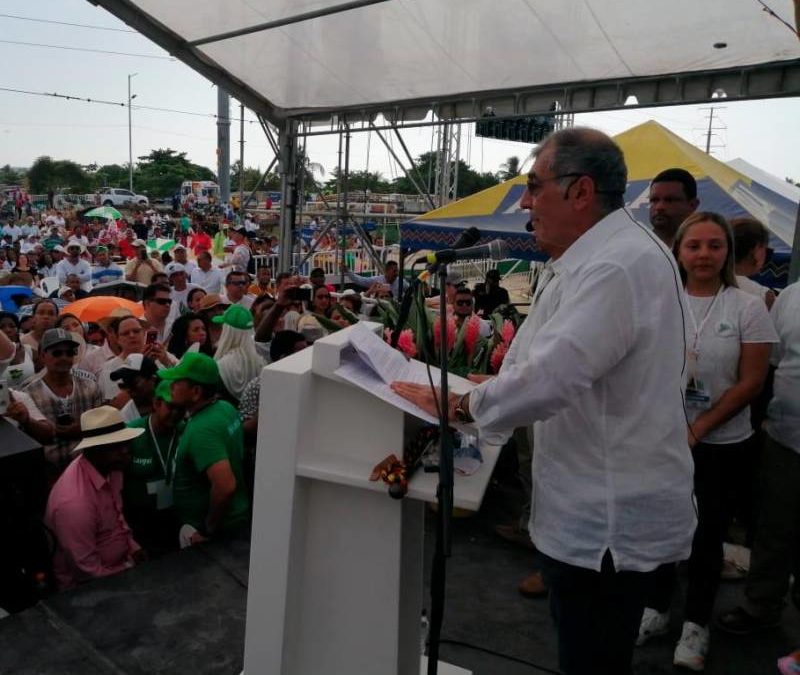Photo: El Universal de Cartagena
On June 7, 2022, the Inter-American Commission on Human Rights (IACHR) began the study of precautionary measures MC MC-439-22, requested by the José Alvear Restrepo Lawyers Collective (Colectivo de Abogados José Alvear Restrepo, -Cajar) in favor of the political rights of Cartagena District Mayor William Dau Chamat and his electorate.
On May 23, the District Comptroller of Cartagena de Indias, Rafael Ignacio Castillo Fortich, requested the suspension of the mayor of Cartagena, William Dau Chamat, for the alleged improper execution of contracts for the performance of Covid19 tests. This occurs in a context of the use of control bodies as a tool to attack political opponents.
It should be recalled that the comptroller in charge, Castillo Fortich, when he served as technical director of Fiscal Responsibility of the same entity, opened a process of Fiscal Responsibility to Mayor Dau and 40 other officials, which ended up annulled for violation of due process, which demonstrates the constant persecution from the control entity to the popularly elected official, in open violation of due process and political rights enshrined in Article 23 of the American Convention on Human Rights.
This case has as background the existence of a pattern of use of disciplinary powers for the purpose of political persecution, in cases such as that of former mayor Gustavo Petro Urrego -which resulted in a conviction against the State for violation of his political rights- former senator Piedad Córdoba in September 2010, former mayor of Medellín Alonso Salazar in April 2012, and, just yesterday, the mayor of Cali Jorge Iván Ospina, all of them being opposition politicians. This persecution worsened with the co-optation of the control bodies by the executive branch during the Duque administration and had its maximum expression during the National Strike of 2021, where it was confirmed by the visit of the IACHR:
The Commission was informed by the Attorney General’s Office that as of June 7, 2021, 172 disciplinary actions were being carried out for events related to the days. Of these, 143 files correspond to members of the security forces, including 139 preliminary inquiries and 4 disciplinary investigations. Likewise, 8 disciplinary actions are being carried out against other public officials, among them, 2 officials of the Ombudsman’s Office. Likewise, the Attorney General’s Office reported that at least 20 “proceedings” have been opened with respect to popularly elected authorities, among them, 3 congressmen, 1 governor, 10 mayors and 6 councilmen. (IACHR, Observations and Recommendations. Working visit to Colombia. June. 2021)
This new episode of suspension request, which is equivalent to a removal of a popularly elected official such as Mayor Dau, by an administrative authority, is expressly prohibited by the decision of the Inter-American Court of Human Rights -IACHR Court- in the case of the former mayor of Bogota, Gustavo Petro, which set the precedent that only through a decision of a criminal judge can such a removal occur. (IACHR Court. Case of Petro Urrego v. Colombia. Preliminary Objections, Merits, Reparations and Costs. Judgment of July 8, 2020. Series C No. 406.)
Despite this ruling, the persecution by the oversight bodies has persisted in cases such as that of the governor of Magdalena Carlos Caicedo and more recently, the mayor of Medellín, Daniel Quintero Calle and the mayor of Cali Jorge Iván Ospina. As of the date of filing of this request for Precautionary Measures, Mayor Dau has not been suspended. However, the media outlet Política Heroica published through social networks an excerpt of the possible suspension decree dated June 4, 2022. Based on the request submitted, through file number MC-439-22, the IACHR will request information from the government and will issue the measures when irreparable damage is imminent, as it happened with Gustavo Petro’s precautionary measures.
We hope that the Commission will adopt precautionary measures in favor of Mayor William Dau, who would see “his political rights affected by the decision of temporary suspension and could eventually be affected in case of a sanctioning measure of a fiscal nature. The effects on the political rights of both measures are contrary to the American Convention, and begin to be experienced immediately. Furthermore, these should have been corrected in the framework of compliance with the Petro Urrego vs. Colombia judgment, a situation that has not occurred”, as stated in the request for precautionary measures.
As stated by attorney Rafael Barrios, co-founder of Colectivo de Abogados José Alvear Restrepo and who represents Mayor Dau and his constituency in this case, “due to the seriousness of the decisions that could lead to his removal and disqualification from the exercise of public functions, it is the criminal justice system that must act and adopt all corresponding decisions, as contemplated in Article 422 of the Colombian Criminal Code (Law 599, 2000). By doing so, an administrative authority fails to comply with the Petro judgment of July 8, 2020, of the IACHR Court and contravenes the principle of good faith with which Colombia must honor its international commitments under the Vienna Convention”. Read his complete column here

